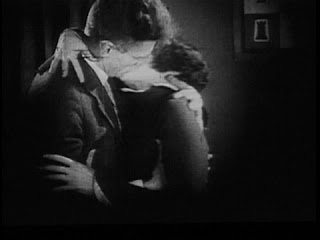The film in question is called Chess Fever, a short comedy that rivals the best American comedies of its time. Jointly directed by Pudovkin and Nikolai Shpikovsky (who also wrote the script), the work centers around the 1925 Moscow chess tournament. Pudovkin took full advantage of this by utilizing actual documentary footage of the event at his disposal, including shots of the renown Cuban chess champion José Capablanca.
 |
| Capablanca in Pudovkin's Chess Fever (1925) |
The film itself utilizes these documentary shots as a means of further advancing the story that Pudovkin sets out to tell. Specifically, they are sewed into the work by way of montage like threads in a finely-woven rug. Unlike Eisenstein, who felt that the montage should also speak to the masses and engage in an emotional appeal, Pudovkin felt that telling the story should be, above all, paramount to its use.
A film theorist as well as a filmmaker, he wrote in 1925 that "two shots cannot be joined together if one of them in some manner or aspect does not continue the other." For Pudovklin, such editing could only be utilized in a continuous manner, as a means for ultimately conveying a "higher idea."
 | ||
| Onlookers young and old watch the chess players intently. |
Using the tournament as a backdrop, Pudovkin brings to us a story. It is a story of a national obsession and pastime with the game of chess. It is also taken and individualized through one character, a Harold Lloyd-esque chess fanatic played by Vladimir Fogel.
Everything about this guy is chess. His flat cap, to his necktie, his socks, and his scarf are all patterned in black-and-white chess checkerboard style. Later, even the tiles of an apartment are fashioned this way, in order to further emphasize the deep level of his mania.
 |
| The hero of Chess Fever. |
Unfortunately for our hero, however, he is torn between two loves: love for the game and for his girlfriend, Vera (played by Pudovkin's actress wife Anna Zemtsova). To her, chess is an obstacle to romance and, in the words of her friend, a "danger to family life." Arriving late at the apartment, our hero at first tries to remedy the situation, but it explodes when Vera finds him more concerned with a mobile chess set than with their relationship.
 |
| Bad move. |
When Vera seeks consolation from her grandfather, he recommends a book: Collection of Ancient Chess Problems. She is then presented with a cake, designed in the manner of a chess board. Indeed, everywhere she turns, there is chess!
 |
| Vera seeking consolation. |
 |
| ...and not finding much help... |
This drives Vera mad, so much so that she decides to take a poison. However, by a twist of fate (or, as a Russian might say, through the irony of fate) she is accidentally given a chess piece instead and finds herself running into none other than Capablanca himself.
"Leave me alone," she shots, not knowing who he is. "Chess has made me hate everyone."
"When I see a beautiful woman, I too begin to hate chess," he responds.
 |
| Vera meets Capablanca |
Eventually, Capablanca teaches Vera the virtues of chess. Encountering our Lloyd-esque hero at the tournament, she makes up with him and the two embrace, both now hopelessly overcome by chess fever.
A fun and humorous little film, Chess Fever is an enjoyable treat for any cinema enthusiast. Yet, the film itself contains so much more. There are many great moments and nuances throughout and Pudovkin and Shpikovsky are especially keen to play upon humor revolving around the obsession and high regard for chess in Russia and the (now former) Soviet republics.
 |
| Chess: a national pastime... |
 |
| ...a national obsession. |










